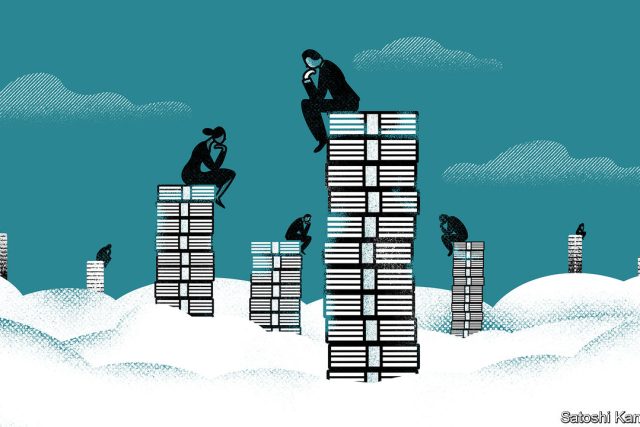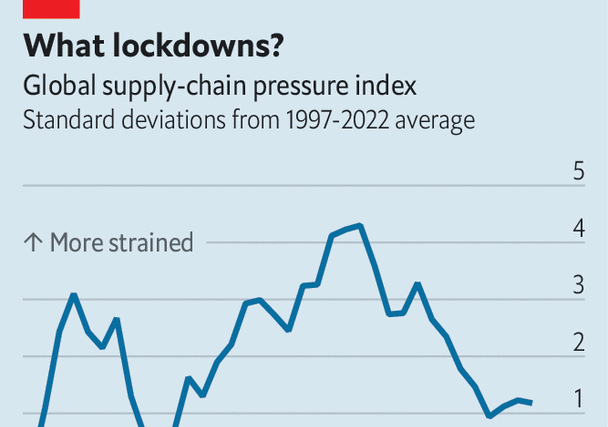Consider the following puzzle. In 2021 venture capitalists raised $150bn in fresh cash, a record amount. Despite a market slowdown, they broke the record once again in 2022, raising more than $160bn. Chunks of this have already been spent, but close to $300bn of “dry powder” sits waiting to be put to use. Indeed, spending fell throughout 2022. Fledgling firms appear cheap. Why, then, are venture capitalists sitting on the cash?
Your browser does not support the
As with many other puzzles in finance, the answer starts with the rapid rise in global interest rates since the start of last year. Higher rates have caused the value of stocks to plummet, as investors have moved capital into safer assets such as cash and government bonds. The tech-heavy nasdaq index has lost more than a fifth of its value over the past year. In 2022 the amount of capital raised in stockmarket listings dropped to a 32-year low. Public-market slowdowns such as the one currently in progress reduce expected returns for investors in private markets by lowering the valuation at which startups “exit” into public markets. Venture capitalists therefore demand lower prices in order to invest in the first place.
This especially hurts funding for late-stage startups that in normal times might be close to a public listing. Some firms, flush with cash from fundraising in 2021, are choosing to wait things out, reducing the pace of new deals. The smaller number continuing with plans must hope to avoid a dreaded “down-round”, in which a startup raises cash at a lower valuation than in a previous round—a let-down for employees and early investors who are forced to confront losses on their shares. Meanwhile, investors have become less willing to take a punt on riskier opportunities. They can no longer count on another backer following them into a deal and helping make it a success either with expertise or raw cash.
The second part of the answer is more subtle. In theory, venture capitalists could spend the money they have in hand. It is, after all, already committed to their funds. For some firms, doing so would mean they would also avoid losing out on management fees which only apply to invested capital, not that merely promised to their funds, after a certain period of time.
But spending at a breakneck pace would almost certainly prove to be self-defeating in the long run. Venture capitalists periodically raise money from limited partners, such as endowments and pension funds. Many of these now want to reduce their exposure to venture capital, since public markets have taken a hit and they seek to keep allocations to different asset classes in rough proportion. As a result, a handful are calling up venture-capital funds to say things to the effect of “don’t rush back” for more money, says an investor in several venture-capital funds.
Venture capitalists are listening. Harry Nelis, a partner at Accel, a venture-capital firm, speculates that cash which might have taken a year to spend during the market boom will now be made to last around three times as long. And spending could get even slower. The money raised by venture-capital funds does not actually sit in their bank accounts. Instead, funds must make “capital calls” to their limited partners when they want to finance an investment. This forces the limited partner to free up cash from elsewhere in their portfolio, which they are loth to do at a time of stress. Funds are well aware that they will want to come back to their partners for more money in the future, so seek to avoid irritating them by placing calls at awkward times. Indeed, in 2001, during a slowdown which followed the dotcom bubble, some investors even “returned” committed funds to limited partners, so that their partners could reallocate the money as they wished.
Venture capitalists have other reasons to be concerned about relations with limited partners. During the recent boom, funds started to poke their noses far beyond their usual concerns. Sequoia Capital, a famous outfit in Silicon Valley, launched a “superfund” which includes investments ranging from traditional venture-capital interests to public-market shares. Some limited partners thought these sorts of funds were absurdly broad, but opted to buy in anyway in order to gain access to specialist funds. Little wonder that venture capitalists are now slamming on the brakes and seeking to repair relations with their limited partners. At least as long as market conditions remain miserable, the industry’s world-conquering ambition will remain on hold. ■
Read more from Buttonwood, our columnist on financial markets:
The dollar could bring investors a nasty surprise (Jan 12th)
Will investors have another awful year in 2023? (Jan 5th)
India’s stockmarkets are roaring. They also have serious faults (Dec 20th)
For more expert analysis of the biggest stories in economics, finance and markets, sign up to Money Talks, our weekly subscriber-only newsletter.




The Most Read
Сryptocurrencies
Bitcoin and Altcoins Trading Near Make-or-Break Levels
Financial crimes
Thieves targeted crypto execs and threatened their families in wide-ranging scheme
Financial crimes
Visa Warning: Hackers Ramp Up Card Stealing Attacks At Gas Stations
News
Capitalism is having an identity crisis – but it is still the best system
Uncategorized
The 73-year-old Vietnamese refugee is responsible for bringing Sriracha to American consumers
Uncategorized
Electric Truckmaker Rivian, Backed By Amazon, Ford, Raises Whopping $1.3 Billion